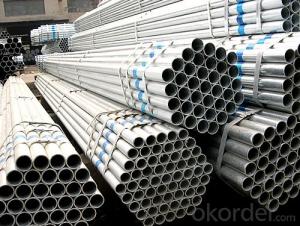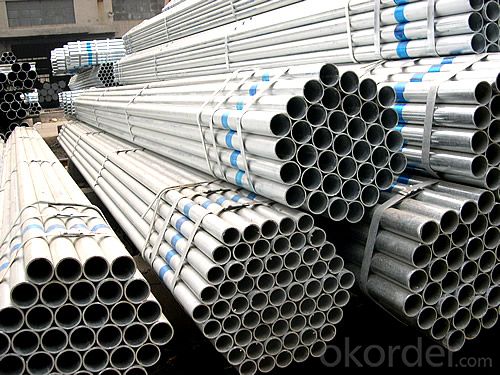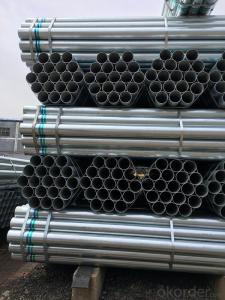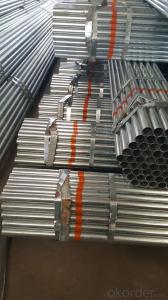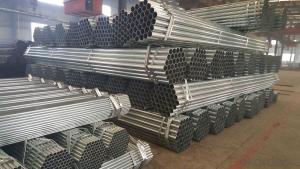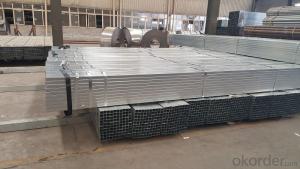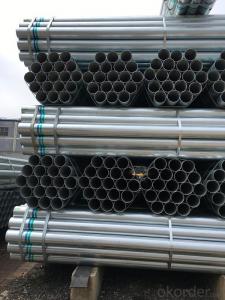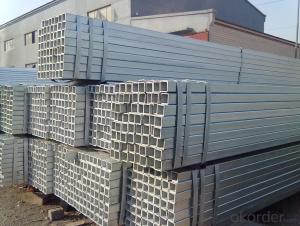Zinc Galvanized Steel Pipe in Building Materials
- Loading Port:
- Qingdao
- Payment Terms:
- TT OR LC
- Min Order Qty:
- 10 m.t.
- Supply Capability:
- 2000 m.t./month
OKorder Service Pledge
OKorder Financial Service
You Might Also Like
Product Description
Product name | Building Materials Zinc Galvanized Steel Pipe |
Out diameter | 5mm-630mm |
Wall Thickness | 0.2mm-3.0mm |
Zn coating mass | 200g-400g/m2 |
Standard | API;ASTM;GB;EN;BS;DIN;JIS |
Quality grade | First grade |
Tolerence of OD | ±0.3mm |
Length | 1m-8m |
MOQ | 10MetricTon |
Deliver Time | 5-10 days after receive your deposits. |
Package | Our products can be packed in bulk, or pvc bag;we also can package as customers requirements |
Payment terms | T/T,L/C |
Usage industry | Construction Foundation Piles,Steel Structure Building, For Low-Pressur Fluid service,Steel Structure Bridges etc. |
Others | We can do special orders as customers requests! We can also can provide all kinds of steel hollow pipes. Sincerely welcomes foreign and domestic customers coming throughout the business negotiations. |
Pictures:
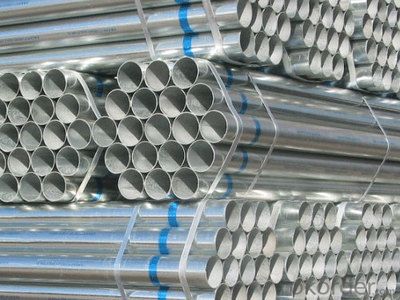
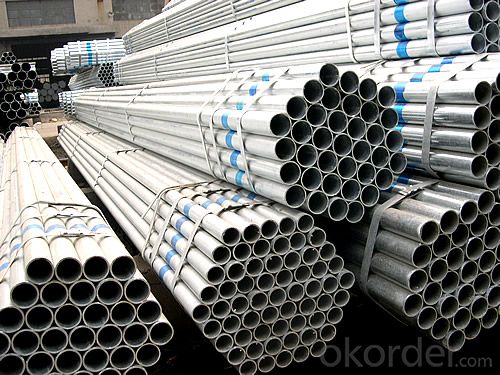
- Q: How can the immersed pipe pile put steel cage into the steel pipe? Which expert to answer?
- Immersed tube cast-in-place pile is one of the many types of pile foundations in civil engineering. The immersed tube cast-in-place pile is also called the cast-in-place pile. It is the use of piling equipment, with reinforced concrete pile boots (valve type steel pipe pile shoe) into the soil, pile hole, and then put into the steel skeleton and concrete pouring, then pull out the casing, using vibration extubation of concrete compaction, forming pile needed. Using hammer sinking pile equipment, sinking pipe and pulling pipe pile is called hammer sinking pipe filling pile. It is called vibro sinking pipe cast-in-place pile by vibrator, vibration sinking pipe and pipe pulling pile. In order to improve the quality and carrying capacity of piles, the construction techniques of single shot, double play and reverse insertion are often used in immersed tube cast-in-place piles. Single game (also called a extubation): extubation, every increase of 0.5 ~ 1.0m, 5 ~ 10s vibration, then extubation in 0.5 ~ 1.0m, this is repeated until all pull out; complex play: two singles were continuously in the same pile hole, or according to the needs of the local retapping. Construction, should ensure that two times before and after the immersed tube axis coincide, and in the concrete before the initial coagulation; inverted plug method: steel pipe lifting 0.5m, and then plug 0.3m, so repeated until the pull out.
- Q: Can steel pipes be used for architectural purposes?
- Yes, steel pipes can be used for architectural purposes. Steel pipes offer various advantages such as durability, strength, and versatility, making them suitable for architectural applications. They can be utilized in constructing building frames, staircases, handrails, and other structural elements. Additionally, steel pipes can be aesthetically pleasing when employed in modern and industrial designs, making them a popular choice for architectural purposes.
- Q: Can steel pipes be used for HVAC systems?
- Yes, steel pipes can be used for HVAC systems. Steel pipes are commonly used in HVAC systems for their durability, strength, and resistance to corrosion. They are suitable for transporting hot or cold air, water, or refrigerant throughout the system.
- Q: What is DN50 for welded pipe?
- Refers to the use of welded steel pipe made of DN50 steel pipe, refers to the inside diameter is 50mm, the market of common DN50 pipe also refers to the 2 inch pipe, standard pipe: 3.5mm thickness, pipe diameter 60mm, the weight of 4.88kg/m theory. DN50 seamless steel pipe, commonly used in the market, has two specifications: 57mm, 60mm, and if no special instructions, 57mm is commonly used. The outer diameter of the welded pipe is only 60mm this specification.
- Q: What are the factors to consider when selecting steel pipes for a specific application?
- When selecting steel pipes for a specific application, several factors need to be considered. The key factors include the required strength and durability, corrosion resistance, temperature and pressure requirements, size and dimensions, cost considerations, and compatibility with other materials or systems. Additionally, factors such as the intended environment, installation requirements, and regulatory compliance should also be taken into account to ensure the optimal selection of steel pipes for the particular application.
- Q: What are the different coating options for steel pipes?
- Steel pipes have numerous coating options to choose from, each serving a specific purpose and offering unique advantages. Some common coating options for steel pipes include: 1. Fusion Bonded Epoxy (FBE) Coating: FBE coating is widely used across industries due to its exceptional corrosion resistance, impact resistance, and adhesion to the pipe surface. This coating is typically applied through a heat-induced chemical reaction, resulting in a durable and protective layer. 2. Polyethylene (PE) Coating: PE coating is commonly employed for underground steel pipes as it provides superior resistance against corrosion, abrasion, and chemicals. It is applied using extrusion techniques, forming a seamless layer that prevents moisture penetration. 3. Polyurethane (PU) Coating: PU coating is renowned for its outstanding resistance to abrasion, chemicals, and harsh environmental conditions. It is frequently used for steel pipes exposed to extreme temperatures or aggressive environments. Multiple layers of PU coating can be applied to enhance protection. 4. Coal Tar Enamel (CTE) Coating: CTE coating is a traditional choice for steel pipes requiring protection against corrosion. It is a thick, black coating that effectively resists water, soil, and atmospheric corrosion. This coating is typically applied using a hot-applied method. 5. Zinc Coating: Zinc coating, also known as galvanization, is a widely used protective coating for steel pipes. It involves applying a layer of zinc to create a barrier against corrosion. Zinc coating can be applied through hot-dip galvanization or electro-galvanization techniques. 6. Concrete Coating: Concrete coating is often utilized for steel pipes in underground or submerged applications. It provides a robust protective layer against corrosion, abrasion, and mechanical damage. Concrete coating is typically applied as a cement mortar or reinforced concrete layer. These options represent just a few of the available coatings for steel pipes. The selection of a coating depends on factors such as the intended application, environmental conditions, and desired durability. Choosing the appropriate coating is crucial to ensure the longevity and performance of steel pipes in various industries.
- Q: How are steel pipes protected from corrosion in corrosive environments?
- Steel pipes are protected from corrosion in corrosive environments through various methods such as coating the pipes with corrosion-resistant materials like epoxy or zinc, using cathodic protection techniques, and implementing regular inspections and maintenance to identify and address any potential corrosion issues.
- Q: How does galvanization protect steel pipes from corrosion?
- Galvanization protects steel pipes from corrosion by forming a protective zinc coating on the surface of the pipes. This zinc coating acts as a barrier between the steel and the surrounding environment, preventing moisture and corrosive elements from reaching the steel. Additionally, if the zinc coating is damaged, it sacrificially corrodes before the steel, further protecting the pipes from rust and corrosion.
- Q: DN150 welded steel tubes one meter multiple
- DN150 welded steel pipe according to the thickness of two specifications: outer diameter 165mm, wall thickness 4.5mm, 17.81Kg per meter weight, wall thickness of 5.5mm, 21.63Kg. per meter weight
- Q: How do you remove rust from steel pipes?
- There exist several methods to eliminate rust from steel pipes: 1. Employ a wire brush or steel wool: Initiate the process by vigorously scrubbing the rusted areas with either a wire brush or steel wool. This action will effectively detach loose rust and flakes from the pipe's surface. 2. Administer vinegar or lemon juice: Immerse a cloth or sponge in white vinegar or lemon juice and generously apply it onto the rusted sections. Allow it to remain undisturbed for several hours or, preferably, overnight. The acidic properties of these substances facilitate the dissolution of the rust. 3. Utilize a rust remover or converter: Numerous rust remover products are readily available on the market. Adhere to the product's instructions and apply it to the affected regions. Typically, these solutions transform rust into a water-soluble compound that can be effortlessly rinsed away. 4. Employ a paste comprising baking soda and water: Combine baking soda with water, creating a thick paste. Apply this paste onto the rusted areas and allow it to sit for a few hours. Proceed to scrub the region using a brush or steel wool before rinsing it off. 5. Experiment with a commercially manufactured rust dissolver: Should the aforementioned approaches fail to yield satisfactory results, it may be worth considering the use of a commercial rust dissolver. These products are specifically designed to eradicate rust from various surfaces, including steel pipes. Comply with the manufacturer's instructions accordingly. Kindly remember to equip yourself with protective gloves, goggles, and a mask when handling rust removal products, as they possess corrosive properties and may release toxic fumes. Furthermore, it is advisable to apply a rust-inhibiting primer or paint subsequent to rust removal to prevent future instances of rusting.
Send your message to us
Zinc Galvanized Steel Pipe in Building Materials
- Loading Port:
- Qingdao
- Payment Terms:
- TT OR LC
- Min Order Qty:
- 10 m.t.
- Supply Capability:
- 2000 m.t./month
OKorder Service Pledge
OKorder Financial Service
Similar products
Hot products
Hot Searches
Related keywords
